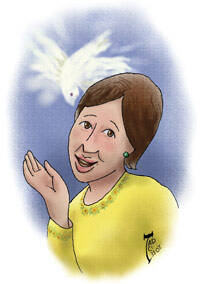Fearless Testimony
I live in Chicago, a city that boasts of its exquisite architecture, and it is easy for me to imagine the admiration of the people in today’s Gospel for the monumental Temple in Jerusalem. Although they weren’t snapping photos and posing in front of skyscrapers as contemporary tourists do, they seem to have been caught up in the same wonder and awe that is evoked by grand buildings. People marvel at the engineering genius of the construction. In the case of temples and cathedrals, their beauty and grandeur lift the mind and heart and help human beings feel connected to the divine.
The reverie of the onlookers in today’s Gospel is broken suddenly by Jesus’ declaration that not one stone would be left upon another. As a Jewish reformer, Jesus frequently spoke and acted in ways that called into question religious structures, both external and internal, that impeded right relationship with God and one another. But for any Jew, the destruction of the Temple by Roman imperial forces would provoke a severe crisis. Everything would have to be resignified. The Temple symbolized their connection with God and their fellow believers. And it was in the Temple that the sacrificial cult was exercised in obedience to the commands of the Torah.
Luke’s Gospel, of course, was written some 15 years after the Temple had been razed. We can imagine the struggles of the Jewish Christian members of the Lucan community, who had to redefine their Jewishness not only in the absence of their Temple, but also as members of a mixed community of Gentile and Jewish followers of Jesus. The Gentile members also had to reconstruct their internal architecture when they took on a Christian identity.
In today’s Gospel, there is a progression, as the discussion moves from the destruction of the Temple to cataclysmic happenings that wreak destruction on the earth and among peoples and, finally, to threats against one’s life. It envisions crises on every level, moving toward an apocalyptic end time. Jesus’ audience does not ask if such will happen. Rather, they ask when it will come about and if they will have advance warning. Jesus never answers those questions. Instead he directs his listeners how to respond to these crises. If they are following him, then they too will say and do things that threaten some of the political and religious structures of their day. Any who claim his name will surely experience the same kind of fury that was directed at him for doing such things.
Jesus does not leave his disciples defenseless in such times of crisis. First of all, he reminds his followers not to follow after anyone else; their attention must remain steadfastly on him. When their focus is on him and not on their tribulations, they are able to stand fearless. He speaks the same words that Gabriel spoke to Zechariah and Mary when their worlds were being turned upside down: “Do not be afraid” (Lk 1:13, 30).
When disciples are seized and persecuted and handed over to the authorities because of Jesus’ name, these are times to testify to the power of God. Jesus explains that the testimony is not a speech that one composes ahead of time. The preparation consists in persevering in a life of faithfulness and trust in the one who provoked crises by his manner of life. It is he, who is himself the temple (to borrow from Johannine theology), who will give the necessary wisdom for speech and action in the critical moment.
This article also appeared in print, under the headline “Fearless Testimony,” in the November 8, 2010, issue.








